
The Metaphysical Society of America
Founded in 1950
Constituent of the American Council of Learned Societies
Books by MSA Members
Books published by members within the last two years are welcome. To have your work listed, please email the Secretary-Treasurer complete details at secretary@metaphysicalsociety.org
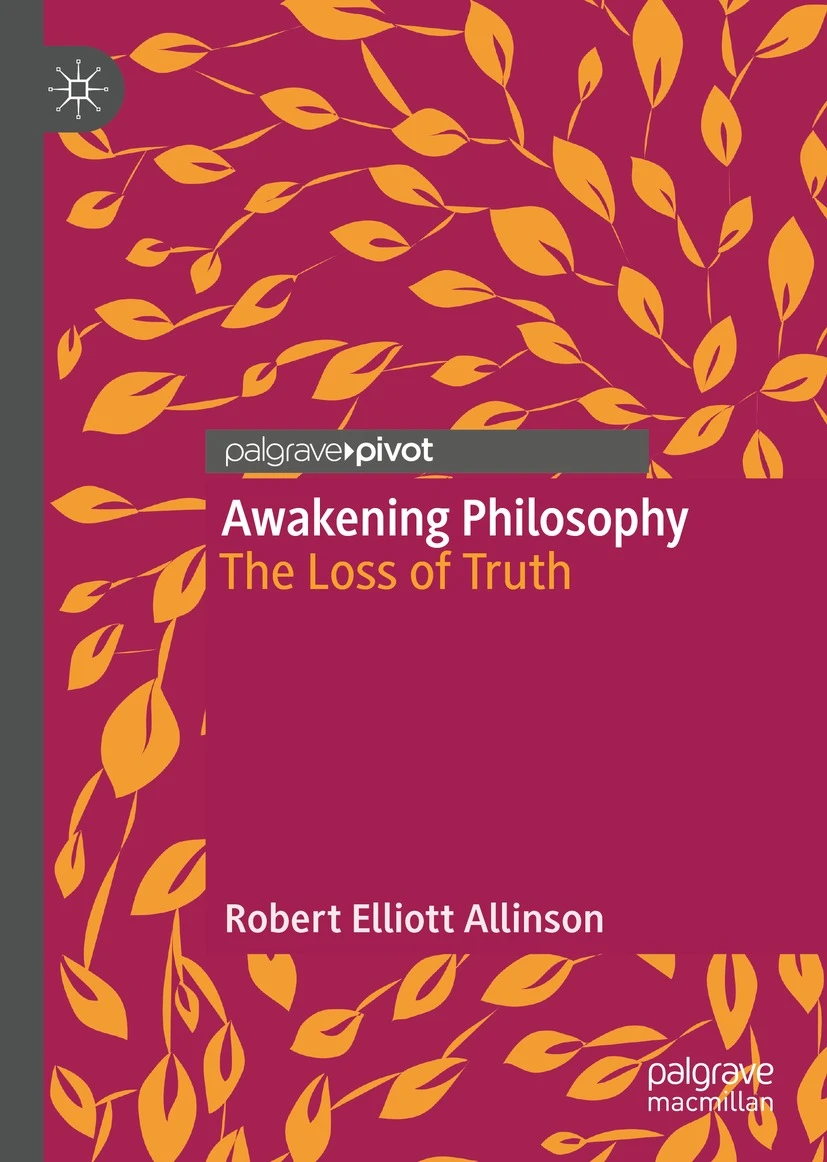 Robert Elliott Allinson
Robert Elliott Allinson
Awakening Philosophy: The Loss of Truth
Springer International Publishing 2022
In this original book, Robert Elliott Allinson asserts that philosophers have been lulled into a dogmatic sleep by Immanuel Kant, the slayer of metaphysics, who has convinced them (and the rest of humanity) that we can never know Reality. Allinson awakens global philosophers from their sceptical slumbers by diagnosing the reason why they have abdicated their traditional calling as leaders of inquiry into truth and wisdom.
Buy it from
Springer.
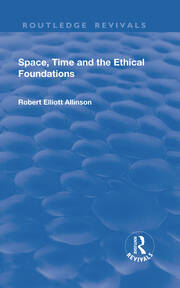 Robert Elliott Allinson
Robert Elliott AllinsonSpace, Time and the Ethical Foundations
Routledge Publishing 2019
This title was first published in 2002: In Space, Time and the Ethical Foundations ideas about space and time are developed, unique to the history of philosophy, that match the new physics. A well grounded metaphysics is presented which offers a safe haven between stifling scepticism and wild imagination, and an original philosophical method is demonstrated which sharply demarcates philosophy from the empirical sciences. A new foundation is laid for ethics by grounding ethics on the author's psycho-biological deduction of the emotions that offers a progressive model to replace the Freudian paradigm. An originally designed trans-cultural ethics, doubly grounded on both Eastern and Western thought, presents an antidote to the contemporary retreat into relativism. Insights from biology, psychology, evolutionary theory and ethics are brought together in a unique and fruitful synthesis. At the same time, human barbarisms such as the Holocaust are pointed to as reminders that there are just limits to compassion. This book presents a sophisticated text for metaphysics, epistemology and systematic ethics.
Buy it from Routledge.
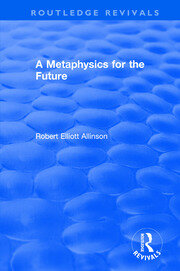 Robert Elliott Allinson
Robert Elliott AllinsonA Metaphysics for the Futures
Routledge Publishing 2019
This title was first published in 2001. This work is intended to serve not only as an expression of a new idea of a philosophy, but as an "apologia" for philosophy as a legitimate and independent discipline in its own right. It argues that in the 20th century, truth has not been abandoned, but merely modified. The text proposes a return to truth and suggests that it is only after apprehending the truths of consciousness that the philosopher's mirror may become a kaleidoscope through which reality may be contemplated. First order truth lies in the realm of discovery, and discovery takes place only within the moment of subjective re-enactment.
Buy it from Routledge.
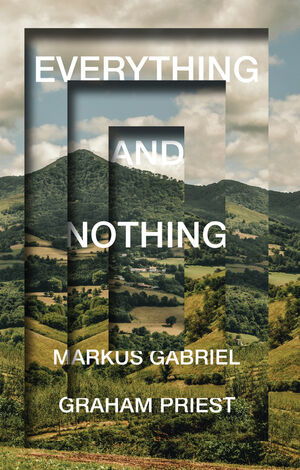 Graham Priest, Markus Gabriel
Graham Priest, Markus GabrielEverything and Nothing
Polity Books 2022
Is it possible for reality as a whole to be part of itself? Can the world appear within itself without thereby undermining the consistency of our thought and knowledge-claims concerning more local matters of fact? This is a question on which Markus Gabriel and Graham Priest disagree. Gabriel argues that the world cannot exist precisely because it is understood to be an absolutely totality. Priest responds by developing a special form of mereology according to which reality is a single all-encompassing whole, everything, which counts itself among its denizens. Their disagreement results in a debate about everything and nothing: Gabriel argues that we experience nothingness once we overcome our urge to contain reality in an all-encompassing thought, whereas Priest develops an account of nothing according to which it is the ground of absolutely everything. A debate about everything and nothing, but also a reflection on the very possibility of metaphysics.
Buy it from Wiley with a 20% discount using the code PPBK1 at checkout.
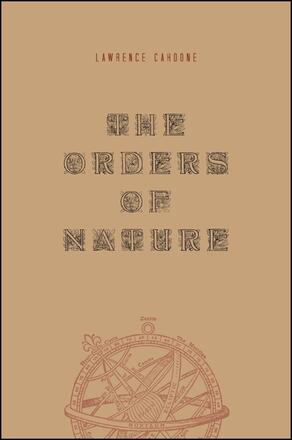 Lawrence Cahoone
Lawrence CahooneThe Orders of Nature
SUNY Press 2013
Winner of the 2015 John N. Findlay Award in Metaphysics presented by the Metaphysical Society of America Reviving and modernizing the tradition of post Darwinian naturalism, The Orders of Nature draws on philosophy and the natural sciences to present a naturalistic theory of reality. Conceiving of nature as systems, processes, and structures that exhibit diverse properties that can be hierarchically arranged, Lawrence Cahoone sketches a systematic metaphysics based on the following orders of nature: physical, material, biological, mental, and cultural. Using recent work in the science of complexity, hierarchical systems theory, and nonfoundational approaches to metaphysics, Cahoone analyzes these orders with explanations of the underlying science, covering a range of topics that includes general relativity and quantum field theory; chemistry and inorganic complexity; biology and telenomic explanation, or "purpose"; the theory of mind and mental causation as an animal phenomenon; and the human mind's unique cultural abilities. The book concludes with an exploration of what answers such a theory of naturalism can provide to questions about values and God.
Buy it from SUNY Press.
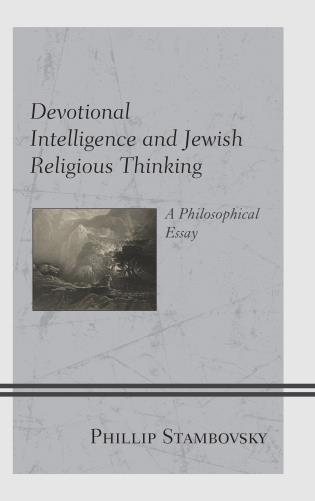 Phillip Stambovsky
Phillip StambovskyDevotional Intelligence and Jewish Religious Thinking: A Philosophical Essay
Rowman and Littlefield 2019
This groundbreaking neo-Maimonidean work establishes, on independently philosophical grounds, the intellectual warrant of Jewish religious thinking as “devotional intelligence.” It demonstrates the purchase and intellectual authority of such thinking by appeal to two dialectically interrelated principles: on the one hand, the metaphysical principle that knowing is of being; and, on the other, “sacral attunement,” a normative principle. Part I distinguishes this study from leading work in contemporary philosophy of Judaism. It introduces the game-changing bid to privilege “intelligence” in the onto-epistemological Aristotelian sense, over epistemologically orchestrated, post-Enlightenment “reason” when it comes to assessing the intellectual soundness of religious thinking. Part II distills contemporary elements of Aristotle’s onto-epistemological psychology of intelligence that Maimonides incorporated in his philosophy of Jewish religious thinking. Further, it finds in Hegel a bridge between Maimonides’ account of devotional intelligence and a modern Maimonidean “science of knowing” dedicated to religious thinking. Part III turns to “sacral attunement,” foregrounding the normative “devotional” aspect of devotional intelligence. It probes the intentionality of both onto-epistemological attunement and the “sacred” relative to “the factor of the transcendent.” In the process it identifies and applies elements of an existential phenomenology of “fundamental attunement” that thematize defining realities of the sacral attunement unique to normative Jewish covenantal praxis. A related analysis of “the sacred” in religious thinking follows, which segues to a chapter on the “factor of the transcendent” as a seminal constituent of meaning in both the sciences and religion. Part IV applies and amplifies key findings in light of a signature Jewish devotional theme: the divine names, approached from a signally Maimonidean, apophatic position indexed to the factor of the transcendent as the “unconditioned condition” (Kant) of intelligible meaning as such. Distinguishing what the divine names indicate from what they refer to, the essay concludes by substantiating the intellectual warrant of Jewish religious thinking as a devotional intelligence of the relation—of identity-in-difference—between the attributive names and the Tetragrammaton.
Buy it from Rowman and Littlefield.
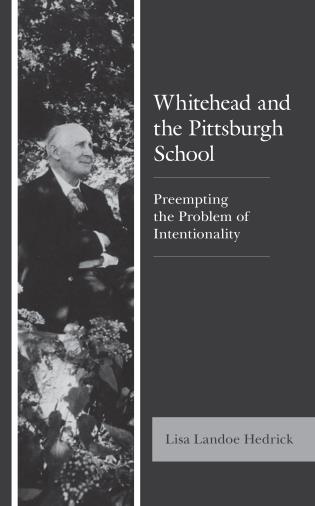 Lisa Landoe Hedrick
Lisa Landoe HedrickWhitehead and the Pittsburgh School: Preempting the Problem of Intentionality
Lexington Books 2021
Whitehead and the Pittsburgh School: Preempting the Problem of Intentionality proposes a revisionary history of the relationship between Alfred North Whitehead and analytic philosophy, as well as a constructive proposal for how thinking with Whitehead can help disabuse analytic philosophy of the problem of intentionality. Lisa Landoe Hedrick defines “analytic” philosophy as primarily the intellectual tradition that runs from Gottlob Frege to Bertrand Russell to Wilfrid Sellars, or, geographically speaking, from Vienna to Cambridge to Pittsburgh between the twentieth and twenty-first centuries. As key members of the Pittsburgh School of philosophy, Robert Brandom and John McDowell pick up the Sellarsian project of reconciling nature and normativity in different ways, yet each of them presupposes a problematic relationship between language and the world precisely bequeathed to them by an implicit metaphysics of subjecthood that characterized analytic thinkers of the early twentieth century. Hedrick both investigates Whitehead’s published and archived critiques of early analytic thought—as an extension of a wider critique of modern philosophy—and employs Whitehead to reimagine nature and normativity after the problem of intentionality by way of his aesthetics of symbolism. This book thereby builds upon a burgeoning effort among philosophers to interface process and analytic thought, but it is the first to focus on contemporary analytic thinkers.
Buy it at a discount from Rowman and Littlefield.
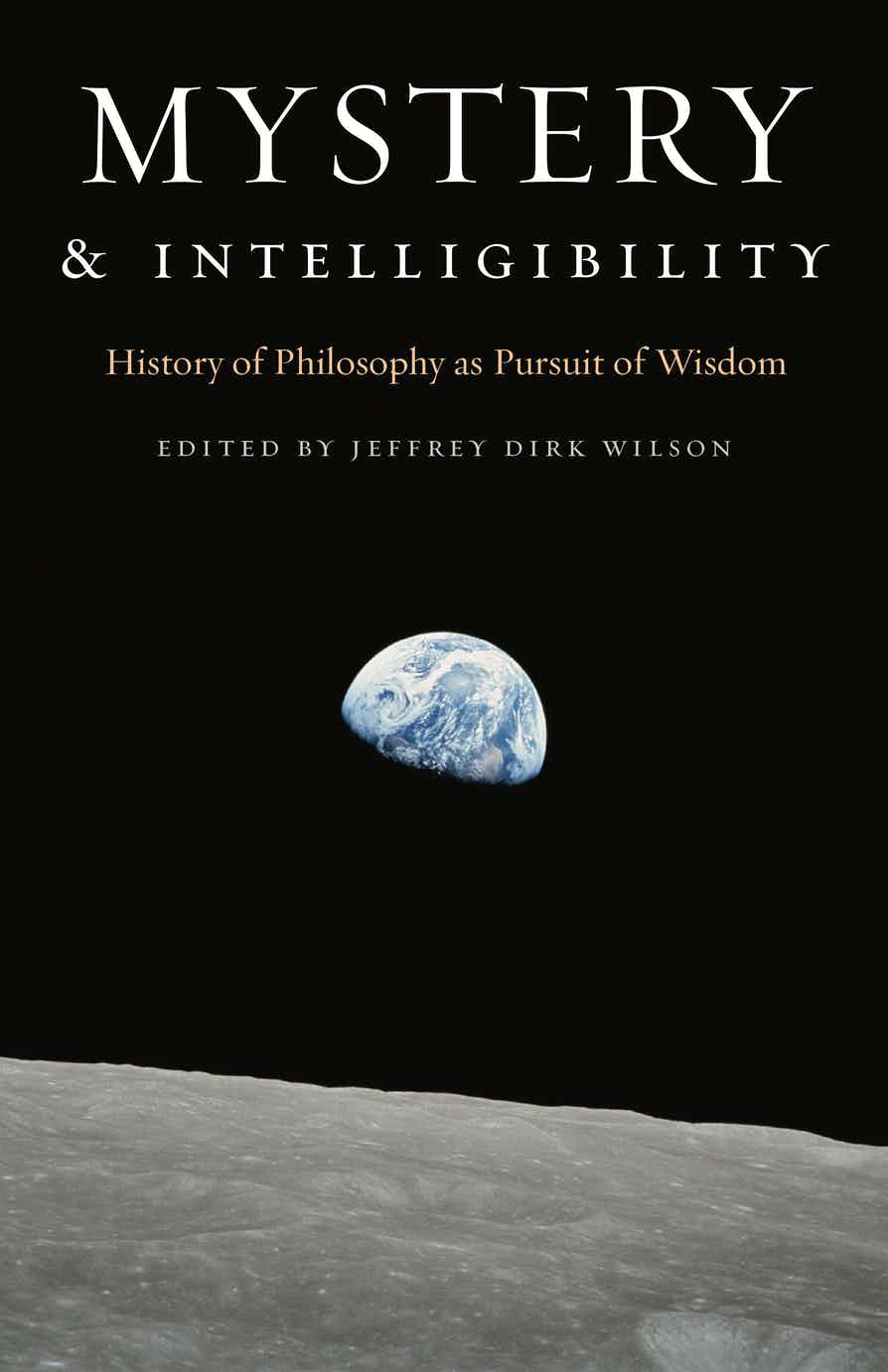 Edited by Jeffrey Dirk Wilson
Edited by Jeffrey Dirk WilsonMystery and Intelligibility: History of Philosophy as Pursuit of Wisdom
Catholic University of America Press 2021
Philosophy is born in its history as pursuit of the wisdom we are never able fully to know. Mystery and Intelligibility: History of Philosophy as Pursuit of Wisdom both argues for that method and presents the results it can achieve.
Editor Jeffrey Dirk Wilson has gathered essays from six philosophical luminaries. In "History, Philosophy, and the History of Philosophy," Timothy B. Noone provides the volume’s discourse on method in which he distinguishes three tiers of history. History of philosophy as method occupies the third and highest tier. John Rist reckons with contemporary corruption of the method in "A Guide for the Perplexed or How to Present or Pervert the History of Philosophy." Wilson’s own essay, "Wonder and the Discovery of Being: From Homeric Myth to the Natural Genera of Early Greek Philosophy," shows the loss of wonder, so evident in mythology, by early Greek thinkers and its recovery by Plato and Aristotle. In "Metaphysics and the Origin of Culture," Donald Phillip Verene demonstrates the wide cultural implications of philosophical discoveries even when the discovery is the boundary of what humans can know. William Desmond offers an essay, "Flux-Gibberish: For and Against Heraclitus," that owes as much to the humor of James Joyce as to the philosophical insights of philosophers, ancient, medieval, and modern. Eric D. Perl’s essay turns to the apophatic character of pursuing wisdom, perhaps especially when asking what may be the most fundamental metaphysical question: "Into the Dark: How (Not) to Ask, ‘Why is There Anything at All.’" Philipp W. Rosemann concludes the volume with the question best asked at the end of this literary seminar, "What is Philosophy?"
Although there are philosophers within the analytic and continental schools who are committed to the history of philosophy, Mystery and Intelligibility demonstrates that history of philosophy as a third and distinct philosophical method is revelatory of the nature and structure of reality.
Buy it from Catholic University of America Press.
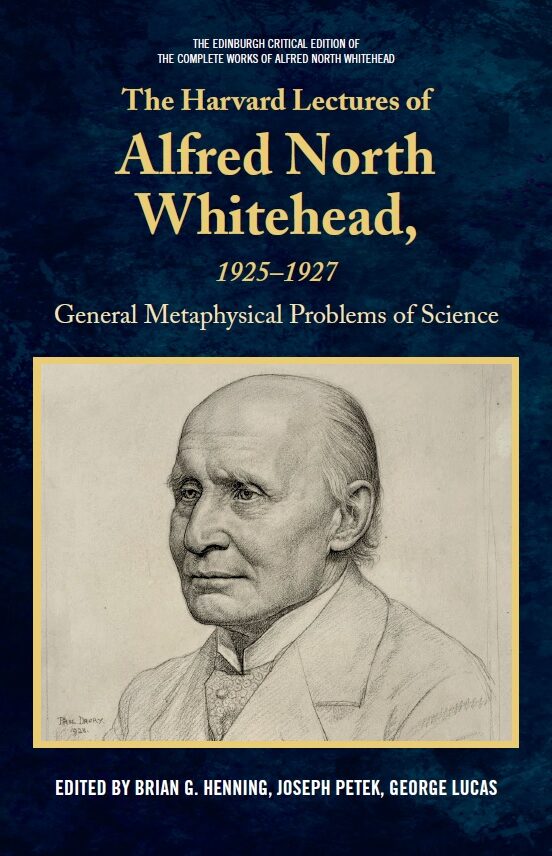 Edited by Brian G. Henning, Joseph Petek, and George R. Lucas, Jr.
Edited by Brian G. Henning, Joseph Petek, and George R. Lucas, Jr.The Harvard Lectures of Alfred North Whitehead, 1925–1927: General Metaphysical Problems of Science (The Edinburgh Critical Edition of the Complete Works of Alfred North Whitehead, Vol. 2)
Edinburgh University Press 2021
For the first time, Whitehead’s readers will be able to see the development of his philosophy during the crucial period between the publication of Science and the Modern World and his delivery of the Gifford lectures that would become Process and Reality as he tests his theories in a classroom setting. The more than 170 lectures delivered by Whitehead during his 2nd and 3rd years at Harvard provide the long-missing window into critical developments in Whitehead’s thinking during this time. They challenge longstanding speculations about when exactly Whitehead developed some of his most famous metaphysical concepts, and how those concepts are to be properly interpreted against the wider backdrop of his life and thought.
Also included is a transcript of the only known lecture Whitehead delivered on the topic of ethics, two mid-year exams given to his students and nearly 2,000 footnotes that provide additional context for the lectures and alternative student accounts of key passages.
Buy it from Edinburgh University Press.
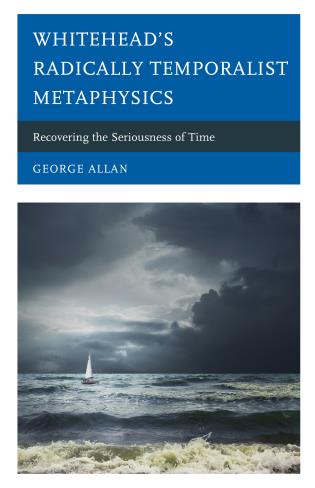 George Allan
George AllanWhitehead’s Radically Temporalist Metaphysics: Recovering the Seriousness of Time
Lexington Books 2020
In Whitehead's Radically Temporalist Metaphysics: Recovering the Seriousness of Time, George Allan argues that Whitehead’s introduction of God into his process metaphysics renders his metaphysics incoherent. This notion of God, who is the reason for both stability and progressive change in the world and who is both the infinite source of novel possibilities and the everlasting repository for the finite values, inserts into a reality that is supposedly composed solely of finite entities an entity both infinite and everlasting. By eliminating this notion of God, Allan draws on the temporalist foundation of Whitehead’s views to recover a metaphysics that takes time seriously. By turning to Whitehead’s later writings, Allan shows how this interpretation is developed into an expanded version of the radically temporalist hypothesis, emphasizing the power of finite entities, individually and collectively, to create, sustain, and enhance the dynamic world of which we are a creative part.
Buy it from Rowman & Littlefield Lexington Press.
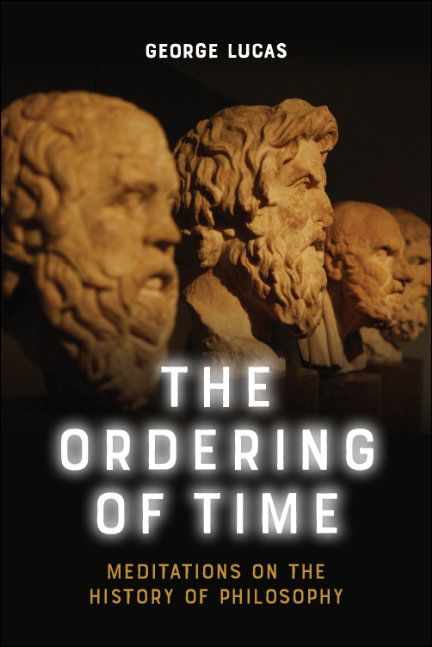 George Lucas
George Lucas
The Ordering of Time: Meditations on the History of Philosophy
Edinburgh University Press 2020
What is the history of philosophy? What exactly is this the history of and how is that history to be understood in relationship to philosophy itself? Can philosophy’s history, on any of a number of diverse descriptions, ever be said in its own right to constitute a unique and genuine source of philosophical wisdom or insight?
George Lucas sweeps aside the constraints of traditional methodological and cultural boundaries to reflect broadly on a variety of answers to these questions, as posed by many of the major philosophical figures of the past century. Inviting a re-consideration of the work of scholars as diverse as Alasdair MacIntyre, Leo Strauss, Jacques Derrida, Michel Foucault, Richard Rorty, Hans-Georg Gadamer, Bertrand Russell, Arthur Danto, Martha Nussbaum, Paul Ricoeur, Charles Taylor, Keith Lehrer and Jerome Schneewind, Lucas ranges widely over the history of philosophy itself in search of original, probing answers to these profound and perennial issues.
Buy it from
Edinburgh University Press.
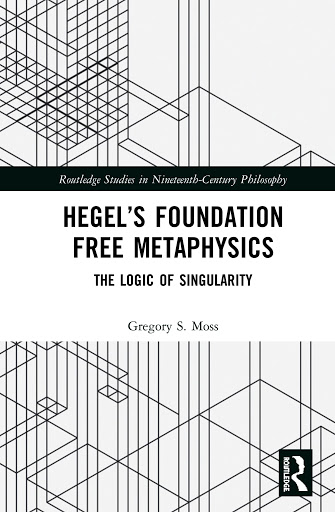 Gregory S. Moss
Gregory S. MossHegel’s Foundation Free Metaphysics: The Logic of Singularity
Routledge Press 2020
Contemporary philosophical discourse has deeply problematized the possibility of absolute existence. Hegel’s Foundation Free Metaphysics demonstrates that by reading Hegel’s Doctrine of the Concept in his Science of Logic as a form of Absolute Dialetheism, Hegel’s logic of the concept can account for the possibility of absolute existence. Through a close examination of Hegel’s concept of self-referential universality in his Science of Logic, Moss demonstrates how Hegel’s concept of singularity is designed to solve a host of metaphysical and epistemic paradoxes central to this problematic. He illustrates how Hegel’s revolutionary account of universality, particularity, and singularity offers solutions to six problems that have plagued the history of Western philosophy: the problem of nihilism, the problem of instantiation, the problem of the missing difference, the problem of absolute empiricism, the problem of onto-theology, and the third man regress. Moss shows that Hegel’s affirmation and development of a revised ontological argument for God’s existence is designed to establish the necessity of absolute existence. By adopting a metaphysical reading of Richard Dien Winfield’s foundation free epistemology, Moss critically engages dominant readings and contemporary debates in Hegel scholarship. Hegel’s Foundation Free Metaphysics will appeal to scholars interested in Hegel, German Idealism, 19th- and 20th-century European philosophy, metaphysics, epistemology, and contemporary European thought.
Buy it from Amazon.com.
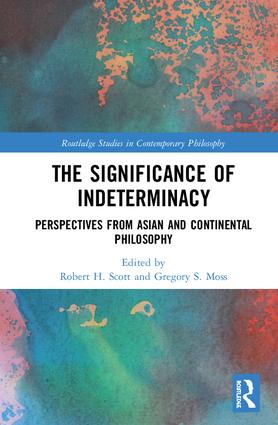 Robert H. Scott and Gregory S. Moss (ed.)
Robert H. Scott and Gregory S. Moss (ed.)
The Significance of Indeterminacy: Perspectives from Asian and Continental Philosophy
Routledge Press 2018
While indeterminacy is a recurrent theme in philosophy, less progress has been made in clarifying its significance for various philosophical and interdisciplinary contexts.
This collection brings together early-career and well-known philosophers—including Graham Priest, Trish Glazebrook, Steven Crowell, Robert Neville, Todd May, and William Desmond—to explore indeterminacy in greater detail.
The volume is unique in that its essays demonstrate the positive significance of indeterminacy, insofar as indeterminacy opens up new fields of discourse and illuminates neglected aspects of various concepts and phenomena.
The essays are organized thematically around indeterminacy’s impact on various areas of philosophy, including post-Kantian idealism, phenomenology, ethics, hermeneutics, aesthetics, and East Asian philosophy.
They also take an interdisciplinary approach by elaborating the conceptual connections between indeterminacy and literature, music, religion, and science.
Buy it from
Amazon.com.
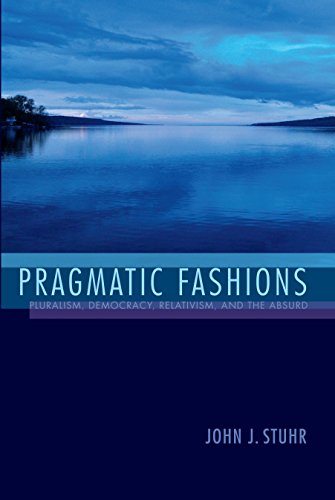 John Stuhr
John Stuhr
Pragmatic Fashions: Pluralism, Democracy, Relativism, and the Absurd
Indiana University Press 2016
John J. Stuhr, a leading voice in American philosophy, sets forth a view of pragmatism as a personal work of art or fashion.
Stuhr develops his pragmatism by putting pluralism forward, setting aside absolutism and nihilism, opening new perspectives on democracy, and focusing on love.
He creates a space for a philosophy that is liable to failure and that is experimental, pluralist, relativist, radically empirical, radically democratic, and absurd.
Full color illustrations enhance this lyrical commitment to a new version of pragmatism.
Buy it from
Amazon.com.
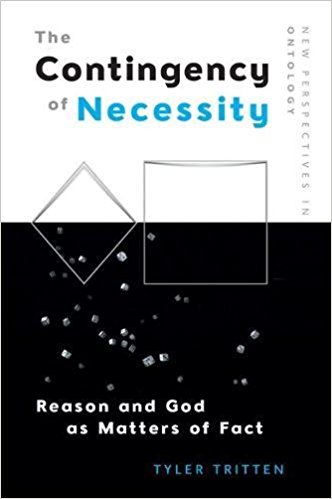 Tyler
Tritten
Tyler
Tritten
The Contingency of Necessity: Reason and God as Matters of
Fact
Oxford University Press 2017
Focusing on the central striking claim that there is something
rather than nothing - that all necessity is consequent - Tritten
engages with a wide range of ancient as well as contemporary
philosophers including Quentin Meillassoux, Richard Kearney,
Friedrich Schelling, Émile Boutroux and Markus Gabriel. He examines
the ramifications of this truth arguing that even reason and God,
while necessary according to essence, are utterly contingent with
respect to existence.
Buy it from
Amazon.com.
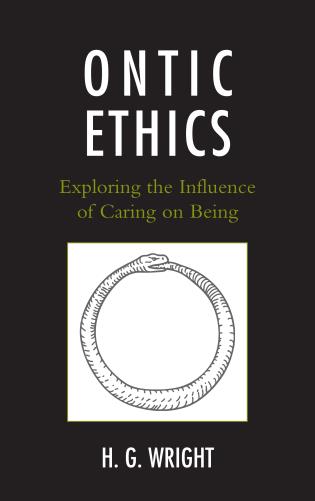 Hollis
G. Wright
Hollis
G. Wright
Ontic Ethics: Exploring the Influence of Caring on Being
Rowman and Littlefield Press 2016
Ontic Ethics: Exploring the Influence of Caring on
Being claims that to care more and better is to exist more and
better. Much has been written about how character affects action,
but this book describes how actions and passions affect character
ontologically. H. G. Wright identifies an independent, not
culturally relative, source for the ethics of care in an ontology of
the self. Ethical and aesthetic flourishing is therefore at once
ontological flourishing of the largest, truest self. The book
includes many illustrations of how behavior and attitudes have
consequences not only for who, but for how much we are. It refines
the concept of flourishing, originating with Aristotle, and shows
how values that encourage flourishing of the world as it relates to
any person, reflexively enhance the flourishing of that person,
hence offering a bridge across the fact/value chasm and a cure for
ethical relativism.
Buy it from
Amazon.com.
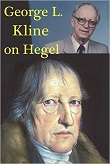 George
L. Kline
George
L. Kline
George L. Kline On Hegel
Gegensatz Press 2015
Fifteen important papers about Hegel covering forty-five years of
work by one of America's most prominent Hegel scholars.
Buy it from
Amazon.com.
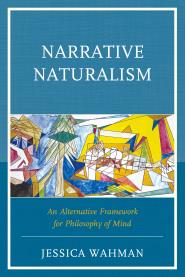 Jessica
Wahman
Jessica
WahmanNarrative Naturalism: An Alternative Framework for Philosophy of Mind
Lexington Books 2015
Narrative Naturalism: An Alternative Framework for Philosophy of Mind provides an original framework for a non-reductive approach to mind and philosophical psychology. Jessica Wahman challenges the reductive (i.e., mechanistic and physicalist) assumptions that render the mind-body problem intractable, and claims that George Santayana’s naturalism provides a more beneficial epistemological method and ontological framework for thinking about the place of consciousness in the natural world. She uses Santayana’s thought as the primary inspiration for her own specific viewpoint, one that draws on a variety of sources, from analytic philosophy of mind to existentialism and psychoanalysis. This outlook, narrative naturalism, depicts sense-making as a kind of storytelling where different narratives serve different purposes, and Wahman offer a unique worldview to accommodate a variety of true expressions about the world, including truths about subjective existence. More...
Buy it from the publisher or from Amazon.
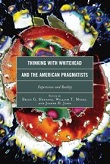 Brian
G. Henning, William T. Myers, Joseph D. John (eds.)
Brian
G. Henning, William T. Myers, Joseph D. John (eds.)
Thinking with Whitehead and the American Pragmatists: Experience
& Reality
Lexington Books 2015
Despite there being deep lines of convergence between the
philosophies of Alfred North Whitehead, C. S. Peirce, William James,
John Dewey, and other classical American philosophers, it remains an
open question whether Whitehead is a pragmatist, and conversation
between pragmatists and Whitehead scholars have been limited.
Indeed, it is difficult to find an anthology of classical American
philosophy that includes Whitehead’s writings. These camps began
separately, and so they remain. This volume questions the wisdom of
that separation, exploring their connections, both historical and in
application. The essays in this volume embody original and creative
work by leading scholars that not only furthers the understanding of
American philosophy, but seeks to advance it by working at the
intersection of experience and reality to incite novel and creative
thought. This exploration is long overdue. Specific questions that
are addressed are: Is Whitehead a pragmatist? What contrasts and
affinities exist between American pragmatism and Whitehead’s
thought? What new questions, strategies, and critiques emerge by
juxtaposing their distinct perspectives?
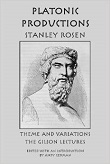 Stanley
Rosen (author)
Stanley
Rosen (author)
Andrew German (ed.)
Platonic Production: Theme and Variations: The
Gilson Lectures
St. Augustine's Press 2014
Platonic Production presents Prof. Stanley Rosen’s Etienne
Gilson Lectures, delivered at the Institut Catholique de Paris and
now available in English for first time. His lectures bring
Heidegger and Plato into a conversation around a basic philosophical
question: Does the acquisition of truth resemble discovery or
production?
While Rosen undertakes a close examination of Heidegger’s engagement
with Plato, exposing some ways in which that engagement constitutes
a misreading, the goals of his study are not exclusively critical.
In arguing against the claim that Plato stands at the beginning of
Western metaphysical history which culminates in late modern
nihilism, Rosen also points out how close Plato is to some
characteristically Heideggerean themes and formulations. Heidegger
is critiqued from the standpoint of Plato, but it is equally true
that Platonic themes (such as the hypothesis of the Forms) are read
anew in light of the questions raised by Heidegger. In keeping with
the overarching theme of the Gilson Lectures, Rosen’s six talks, and
the introduction by the volume’s editor aim to demon-strate that
metaphysics is always possible, indeed inescapable, by meditating on
the two philosophers whose thinking, especially where it diverges,
centers on that very point.
Buy it from the publisher or Amazon.
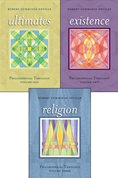 Robert
Cummings Neville
Robert
Cummings Neville
Philosophical Theology (3 volumes)
SUNY Press 2015
A trilogy advancing a systematic philosophical theology.
Buy it from the
publisher
This three-volume set gathers together Robert Cummings Neville’s
systematic development of a new philosophical theology. Each volume, Ultimates, Existence,
and Religion,
considers first-order questions generally treated by religious
traditions through philosophical methods while reflecting Neville’s
long engagement with philosophy, theology, and Eastern and Western
religious traditions. His philosophical theory of value enlightens
religions’ approaches to ethics, spirituality, and religious
institutional living and collaboration. Through the development of
philosophical theology, Neville has built a unique,
multidisciplinary, comparative, nonconfessional theological system,
one that addresses concerns and provides tools for scientific and
humanistic scholars of religion, postmodern thinkers, intellectuals
from both secular and religious backgrounds, and those interested in
the global state of religion today.
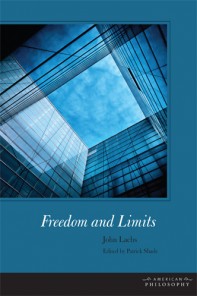 John
Lachs
John
Lachs
Patrick Shade (editor)
Freedom and Limits
Fordham University Press 2014
Freedom and Limits is a defense
of the value of freedom in the context of human finitude. A
contribution to the American tradition of philosophy, it focuses
attention on moral problems as we encounter them in daily life,
where the search for perfection and the incessant drive to meet
obligations make it difficult to attain satisfaction. The book
argues that uniformity is unproductive: Human natures are varied and
changeable, making the effort to impose a unitary good on everyone
futile. Moreover, we don’t need to strive for more than what is good
enough: Finite achievements should be adequate to satisfy finite
people.
More from the
publisher
The ultimate aim of the book is to reclaim the role of philosophy as
a guide to life. In doing so, it presents discussions of such
important philosophers as Fichte, Hegel, Peirce, Dewey, James, and,
above all, Santayana.
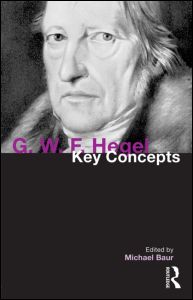 Michael
Baur
(editor)
Michael
Baur
(editor)
G. W. F. Hegel: Key
Concepts
Routledge 2014
G. W. F. Hegel: Key Concepts provides an accessible
introduction to both Hegel's thought and Hegel-inspired philosophy
in general, demonstrating how his concepts were understood, adopted
and critically transformed by later thinkers. The first section of
the book covers the principal philosophical themes in Hegel's
system: epistemology, metaphysics, philosophy of mind, ethical
theory, political philosophy, philosophy of nature, philosophy of
art, philosophy of religion, philosophy of history and theory of the
history of philosophy. The second section covers the main
post-Hegelian movements in philosophy: Marxism, existentialism,
pragmatism, analytic philosophy, hermeneutics and French
poststructuralism.
Buy it from
Amazon
 Hava
Tirosh-Samuelson and Aaron W. Hughes (eds.)
Hava
Tirosh-Samuelson and Aaron W. Hughes (eds.)
Lenn E. Goodman: Judaism, Humanity, and Nature
Brill 2015
Lenn E. Goodman is Professor of Philosophy and Andrew W. Mellon Professor in the Humanities at Vanderbilt University in Nashville, Tennessee. Trained in medieval Arabic and Hebrew philosophy and intellectual history, his prolific scholarship has covered the entire history of philosophy from antiquity to the present with a focus on medieval Jewish philosophy. A synthetic philosopher, Goodman has drawn on Jewish religious sources (e.g., Bible, Midrash, Mishnah, and Talmud) as well as philosophic sources (Jewish, Muslim, and Christian), in an attempt to construct his own distinctive theory about the natural basis of morality and justice. Taking his cue from medieval Jewish philosophers such as Maimonides, Goodman offers a new theoretical framework for Jewish communal life that is attentive to contemporary philosophy and science.
Publisher's website
Ernst Cassirer and the Autonomy of
Language examines the central arguments in Cassirer’s first
volume of the Philosophy of Symbolic Forms. Gregory Moss
demonstrates both how Cassirer defends language as an autonomous
cultural form and how he borrows the concept of the “concrete
universal” from G. W. F. Hegel in order to develop a concept of
cultural autonomy. While Cassirer rejected elements of Hegel’s
methodology in order to preserve the autonomy of language, he also
found it necessary to incorporate elements of Hegel’s method to save
the Kantian paradigm from the pitfalls of skepticism. Moss advocates
for the continuing relevance of Cassirer’s work on language by
situating it within in the context of contemporary linguistics and
contemporary philosophy. This book provides a new program for
investigating Cassirer’s work on the other forms of cultural
symbolism in his Philosophy of Symbolic Forms, by showing how the
autonomy of culture is one of the leading questions motivating
Cassirer’s philosophy of culture. With a thorough comparison of
Cassirer’s theory of symbolism to other dominant theories from the
twentieth century, including Heidegger and Wittgenstein, this book
provides valuable insight for studies in philosophy of language,
semiotics, epistemology, pyscholinguistics, continental philosophy,
Neo-Kantian philosophy, and German idealism.
Buy it on
Amazon
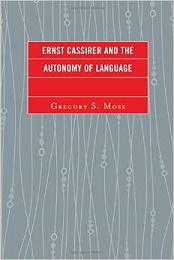 Gregory
S. Moss
Gregory
S. Moss
Ernst Cassirer and
the Autonomy of Language
Lexington Books 2014
Publisher's website
Buy it on
Amazon
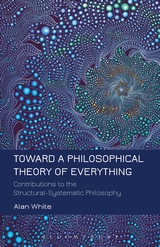 Alan
White
Alan
White
Toward a Philosophical Theory of Everything:
Contributions to the Structural-Systematic Philosophy
Bloomsbury Academic 2014
Publisher's website
Buy it on
Amazon
“TAPTOE opens
philosophical inquiry to ‘everything’ by not restricting the
universe of discourse in the quest for comprehensive knowledge. The
critiques of philosophical views on truth, knowledge, freedom,
beauty, being, and God are carefully argued, and the discussions
engage with current literature.... This is a critically important
work for all those deeply interested in philosophical issues and
their significance for basic human concerns…. Highly recommended.”
– H.
C. Byerly, emeritus, University of Arizona, CHOICE,
August 2014
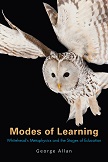
George Allan
Modes of Learning
Publisher's website
Buy it at Amazon
A highly accessible reading of Whitehead’s writings on education and their connection to his metaphysics.
Educators are familiar with Alfred North Whitehead’s three stages of education: romance, precision, and generalization. Philosophers are familiar with his metaphysical theories about the primacy of temporal processes. In Modes of Learning, George Allan brings these two sides of Whitehead’s thought together for the first time in a book suitable for both those initially approaching Whitehead’s metaphysics and experts.
Allan develops a series of analogies between Whitehead’s ideas about how we learn and key concepts in his later metaphysical writings, demonstrating that both how we learn and how the world changes involve a tension between open-ended exploration and systematic organization. Novel ideas free us from the blinders imposed by old habits and beliefs. Yet only when these ideas are integrated with the old ways are we able to improve our individual and collective lives—until changing circumstances call for further new ideas and fresh integrations.
Using a rich variety of examples, Allan illuminates the metaphysical ideas he explores by tethering them concretely to the educational practices in which they are rooted. This shows a key but neglected feature of Whitehead’s thought: his pragmatic theory of truth, with its functionalist approach to experience and its humanistic appreciation of the frailty of all human endeavors.
“The book is highly recommended for, as Allan says, professional educators—and all ‘intelligent readers,’ which ‘include[s] parents.’” — CHOICE
George Allan is Professor Emeritus of Philosophy at Dickinson College. He is the author of many books, including The Importances of the Past: A Meditation on the Authority of Tradition; The Realizations of the Future: An Inquiry into the Authority of Praxis; The Patterns of the Present: Interpreting the Authority of Form; and Higher Education in the Making: Pragmatism, Whitehead, and the Canon, all also published by SUNY Press.
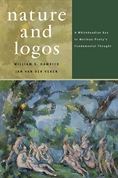 William S. Hamrick and Jan Van der Veken
William S. Hamrick and Jan Van der Veken Nature and Logos, A Whiteheadian Key to Merleau-Ponty's Fundamental Thought
State University of New York Press 2012
Publisher's website
Buy it at Amazon
This is the first book-length account of how Maurice Merleau-Ponty used certain texts by Alfred North Whitehead to develop an ontology based on nature, and how he could have used other Whitehead texts that he did not know in order to complete his last ontology. This account is enriched by several of Merleau-Ponty’s unpublished writings not previously available in English, by the first detailed treatment of certain works by F. W. J. Schelling in the course of showing how they exerted a substantial influence on both Merleau-Ponty and Whitehead, and by the first extensive discussion of Merleau-Ponty’s interest in the Stoics’s notion of the twofold logos - the logos endiathetos and the logos proforikos. This book provides a thorough exploration of the consonance between these two philosophers in their mutual desire to overcome various bifurcations of nature, and of nature from spirit, that haunted philosophy and science since the seventeenth century.
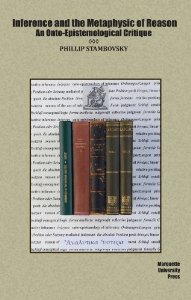 Phillip
Stambovsky
Phillip
StambovskyInference and the Metaphysic of Reason: An Onto-Epistemological Critique
Marquette University Press 2009
Publisher's website
Buy it at Amazon
This book elucidates how the so-called “problem of inference,” long a matter of debate among philosophers of logic, epistemology, language, and other domains of speculation, is inextricably tied to the issue of how, in the classical idiom, Knowing is of Being. Motivating this project is an underlying question that guides the discussion throughout: namely, How is it most rational to orient ourselves in thinking about the way that the inferential intelligence articulates the actual? The principal task of the essay as a whole is to think-through this metaphysical question by addressing the Reason (Vernunft) of the act of inference critically and from an onto-epistemological standpoint.
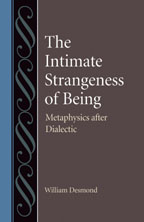 William Desmond
William Desmond
The Intimate Strangeness of Being: Metaphysics after Dialectic
Catholic University Press 2012
Publisher website
Buy it on Amazon
This book explores the contested place of metaphysics since Kant and Hegel, arguing for a renewed metaphysical thinking about the intimate strangeness of being. There is a mysterious strangeness to being at all, and yet there is also something intimate. Without the intimacy, argues William Desmond, we become strangers in being; without the mystery, we take being for granted. The book locates the origin of metaphysics' contested place in recessed equivocations in Kantian critique and Hegelian dialectic, equivocations that keep from view the more original sources of metaphysical thinking. It takes issue with contemporary claims about the "overcoming of metaphysics" associated with Heidegger, the "deconstruction of metaphysics" associated with Derrida, as well as with claims that a new "post-metaphysical thinking" is necessary.
The book begins with an exploration of the status of metaphysics in light of equivocations in Hegelian dialectic. It then offers an assessment of metaphysics in light of critique and deconstruction. Finally, it proposes an affirmative rethinking of the constant perplexities of being in terms of a metaxological metaphysics. This metaphysics involves a thinking of the between (metaxu ) that characterizes Desmond's singular approach, and that he also has distinctively developed in his other works. Addressing the problematic state of metaphysics in recent centuries, this metaxological metaphysics tries to be true to both the strange mystery and the intimacy, to be faithful to the constant perplexities of being, and to recuperate appreciatively some of the rich resources of the longer philosophical tradition.
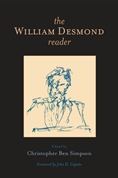 The William Desmond Reader
The William Desmond Reader
Publisher website
Buy it on Amazon
Career-spanning selections from the writings of William Desmond.
Known especially for his original system of metaphysics in a trilogy
of books published between 1995 and 2008, and for his scholarship on
Hegel, William Desmond has left his mark on the philosophy of
religion, ethics, and aesthetics. The
William Desmond Reader provides
for the first time in a single book a point of entry into his
original and constructive philosophy, including carefully chosen
selections of his works that introduce the key ideas, perspectives,
and contributions of his philosophy as a whole. Also featured is an
original essay by Desmond himself reflecting synthetically on the
topics covered, as well as an interview by Richard Kearney.
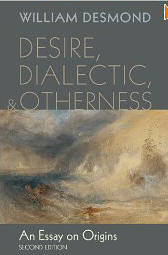 Desire, Dialectic and Otherness: An Essay
on Origins, 2nd edition
Desire, Dialectic and Otherness: An Essay
on Origins, 2nd edition
Wipf & Stock, 201
Many philosophers since Hegel have been disturbed by the thought that philosophy inevitably favors sameness over otherness or identity over difference. Originally published at a time when the issue was not so widely discussed in the English-speaking world, William Desmond here offers a constructive and positive approach to the problem of difference and otherness. He systematically explores the question of dialectic and otherness by analyzing how human desire inevitably seeks immanent wholeness in a manner that opens it to irreducible otherness. He faces the difficulties bequeathed to Continental thought by Hegelian dialectic and its tendency to subordinate difference to identity, whether appropriately or not. Unlike many recent critics of Hegel, he argues that we must preserve what is genuine in dialectic. Granting the positive power of dialectic, Desmond offers his first articulation of a further philosophical possibility--what he terms the Metaxological--a discourse of the "between," a discourse doing justice to desire's search for wholeness without any truncating of its radical openness to otherness. In a wide-ranging yet unified discussion, Desmond tackles such issues as the nature of the self, the ambiguous restlessness and inherent power of being revealed by human desire, desire's relation to transcendence, its openness to otherness in agapeic good will and in relation to the sublime as an aesthetic infinitude. Finally, Desmond brings this metaxological understanding to bear on the metaphysical question of the ultimate origin.
William Desmond is currently professor of philosophy at Katholieke Universiteit Leuven as well as David Cook Visiting Chair at Villanova University. He is the author of many books, including Being and the Between (winner of the Prix Cardinal Mercier and the J.N. Findlay Award for best book in metaphysics, 1995-1997); Is There a Sabbath for Thought?: Between Religion and Philosophy; and God and the Between. He has also edited five books and published more than 80 articles. He is past president of the Hegel Society of America, the Metaphysical Society of America, and the American Catholic Philosophical Association.
MSA Listserv
Social
Media
Click here to subscribe to the MSA-L or to
change your subscription.
Follow us on
Facebook
